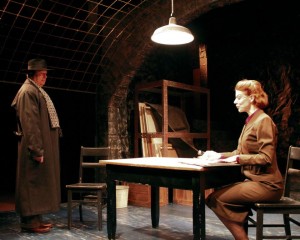A Picasso by Jeffrey Hatcher, Salem Theatre Company, 4/26/12-5/19/12, http://www.salemtheatre.com/on_stage.htm.
Reviewed by Gillian Daniels
(Salem, MA) With nowhere to go, two characters bounce off each other, alternating between affection and violence. Their relationship follows a familiar trajectory. The World War II bunker where both are trapped is a well-mined setting, too. Still, it’s satisfying to watch Pablo Picasso (Stephen Cooper) and his German interrogator, Ms. Fischer (Linda Goetz), scrape each other raw in The Salem Theatre Company’s production of A Picasso.
Cooper’s middle-aged Picasso is a rampant egotist and womanizer, fearing for his life before Ms. Fischer begins to ask him about his paintings. Then his confidence reasserts itself. Even when his fate is in the hands of Goetz’s flinty interrogator, Picasso’s vulnerabilities are fleeting. The play holds him up as a superhuman of sorts. For those who already know of the painter’s controversial lifestyle, few revelations will be revealed that aren’t already well-documented in biographies.
Goetz’s character, meanwhile, is allowed to stumble. Beneath her dangerous shell, she reveals complex feelings towards Picasso, Germany, and the purpose of art in times of war. Ms. Fischer has made difficult choices. Meanwhile, dressed in the persona of one of the most titanic artist’s of the twentieth century, Cooper is somehow not as fascinating. He’s funny and charming, though, and is given some of the play’s best lines.
Jeffrey Hatcher’s A Picasso is at its best when unrestrained by the confines of fact. With only two characters, the backdrop of the war is recited to one another in clunky lines of dialogue. Biographical data is inserted uncomfortably between more vibrant turns of phrase.
I understand it’s important to furnish a piece of historical fiction with enough background for the audience, but it’s more fun to watch the characters interact. Their relationship is the meat of the plot and evolves tensely. Sometimes Picasso and Ms. Fischer are at one another’s throats. Other times they’re lost in a strange seduction, though it’s often unclear who is doing the seducing and to what end.
A Picasso is comforting in the pattern it gives audiences. Both characters learn, grow, and hurt each other with exquisite chemistry. Their tangled relationship is intriguing and nuanced enough to carry the story even if the play itself doesn’t cover new ground.

